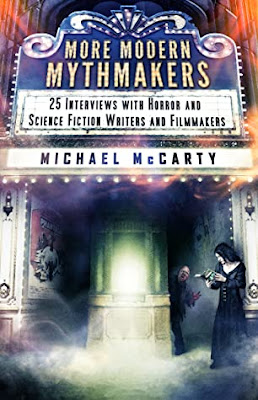Michael McCarty, More Modern Mythmakers: 25 Interviews With Horror, Fantasy and Science Fiction Writers and Filmmakers. Crystal Lake Publishing, 2022. Pp. 274. ISBN 978-1-957133-14-0. $15.99.
Reviewed by Jason Kahler
 Michael McCarty has published dozens of books, especially non-fiction work about genre writers and artists. Crystal Lake Publishing is a relative newcomer, but they’ve already started distinguishing themselves by having a good eye for talent and publishing books that enhance the horror and science fiction community. More Modern Mythmakers is a strong collection of interviews that are a testament to McCarty’s access and eye, and the book would make a nice addition to your shelf, but it has some shortcomings that make it less than completely successful for a book of its kind.
Michael McCarty has published dozens of books, especially non-fiction work about genre writers and artists. Crystal Lake Publishing is a relative newcomer, but they’ve already started distinguishing themselves by having a good eye for talent and publishing books that enhance the horror and science fiction community. More Modern Mythmakers is a strong collection of interviews that are a testament to McCarty’s access and eye, and the book would make a nice addition to your shelf, but it has some shortcomings that make it less than completely successful for a book of its kind.
What makes for a good interview? Maybe I just don’t know. As a result, I’m left not being able to recommend this book as much as I wish I could, and to some extent, as much as I think I should. When you see the table of contents, if the authors’ names excite you, I think you’ll be happy when you read this collection. If you’re lukewarm about the subjects and looking for a deep dive into genre workers’ secrets, I think you’ll be disappointed.
Michael McCarty’s bibliography speaks for itself—he’s a successful interviewer and writer—but I fail to see in More Modern Mythmakers the sparkle I’d expect from truly gifted interviewers who know how to crawl into their subjects and find the stories. Too many of the interviews in this book are loaded with similar questions: What’s the inspiration for this story? How did it feel to win that award? Any final thoughts? The answers to these questions rarely extend beyond two or three sentences, and never dip below what seems to be an expected surface. My impression is that, because McCarty is so eager to produce career-spanning interviews, there isn’t enough time or space to probe into any topic more deeply. It feels so often like a missed opportunity. I yearned for Columbo.
There are also too many questions easily answered through research that could have been skipped in favor of a more intriguing question. For example, Joe Landsdale is asked “What are some of your other comic book endeavors?” Why waste that question in favor of asking about something he’s written specifically? I’m not sure. Similarly, almost every writer is asked a variation of “Was that hard to do?” The answers are always what you’d expect. That’s disappointing. Perhaps McCarty’s other non-fiction books probe a little more deeply into their subjects. Since More is the latest in a string of interview books he’s written, there’s a possibility that these are the interviews that didn’t quite make the cut for earlier editions.
McCarty’s respect for and fandom of his subjects is clear, and the excitement bubbles through. If I were to play armchair psychologist for a moment, I’d guess that McCarty’s enthusiasm for genre and the people working in it shades these interviews too deeply. This isn’t the book to pick up if you’re looking for the juicy tidbits and behind-the-scenes backstabbing of sci-fi and horror pros. It’s a friendly book devoid of offense, and while it’s nice that everyone speaks so highly of each other, I don’t feel like I put this book down having learned much that I didn’t already know.
More Modern Mythmakers does a great job, however, of cementing your appreciation of the favorites that appear here. And there is almost certainly someone here you admire greatly. Don’t let the “More” in the title fool you into thinking McCarty is scraping the bottom of the genre barrel. While some of the personalities from cult movies were unfamiliar to me, names like Bentley Little, Terry Brooks, Alan Dean Foster, Lansdale, Harry Turtledove, and Larry Niven leap out of the table of contents. There are several people interviewed for the book who have since passed away; their fans will certainly appreciate new material from and about them coming available. It’s a nice representation of the recent past and ongoing present of science fiction, fantasy, and horror.
Turtledove is a personal favorite of mine, so I read his interview closely. In McCarty’s hands, Turtledove comes across as charming, funny, intelligent—just delightful. Your favorite is presented the same way. I knew the story of Turtledove’s real name and pen name already, but the reading of it here was nice. The saucy exchange between Turtledove and McCarty about the War of 1812 is one of the book’s highlights. Connie Willis was new to me, and I found myself enjoying her interview a lot, especially her musings about time travel.
I wanted to really enjoy the interviews here in More Modern Mythmakers. I like the subjects as people, and nothing in the book changes that. I like McCarty; when he “appears” in the book, he’s clearly a fan another fan would appreciate hanging out with. In the end, while I recommend this book to people who want to know more about the history and current events of science fiction, fantasy and horror, I think diehard fans will wish McCarty had put on a rumpled beige raincoat and asked “Just one more thing” a little more often.

No comments:
Post a Comment